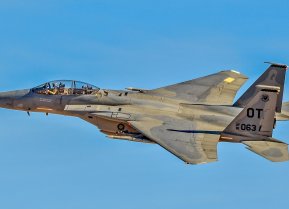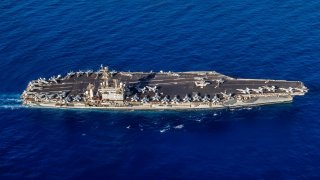The 'Squad' Faces Real Challenges in the South China Sea
The Squad, a grouping of the United States, Australia, Japan, and the Philippines, is seen as a military response to Chinese aggression in the South China Sea (SCS). However, the Philippines' relatively weak military capabilities may hinder the effectiveness of this alliance.
Summary and Key Points: The Squad, a grouping of the United States, Australia, Japan, and the Philippines, is seen as a military response to Chinese aggression in the South China Sea (SCS). However, the Philippines' relatively weak military capabilities may hinder the effectiveness of this alliance.
-While the Philippines is working to bolster its defense, the country's reliance on non-military strategies and its fluctuating foreign policy complicate the Squad's ability to deter China.
-Domestic political dynamics in member countries, especially in the Philippines and the U.S., will significantly impact the Squad's future effectiveness in countering China's assertiveness in the region.
The Squad, a minilateral grouping comprising the United States, Australia, Japan, and the Philippines, has garnered substantial attention as a bloc intending to counter Chinese aggression in the South China Sea (SCS). While the Quad has been unable to acquire a military dimension, some analysts perceive the Squad, consisting of the United States’ treaty allies, as a concrete military response to Chinese aggression.
Though Squad members hold no obligations toward each other, their substantial combined capabilities present a promising instrument in deterring Chinese assertiveness against the Philippines in the South China Sea. While the grouping crystallized due to Beijing’s increased coercion of Manila, the Philippines’ being the weakest link may inhibit the Squad from building robust deterrence strategies.
Unlike other Squad members, the Philippines lacks a robust military capability. Though Manila increased its defense budget to US$4.1 billion, the Philippines still ranks 34th out of 145 countries according to the 2023 Military Power Index.
The Squad’s ability to deter China hinges primarily on the Philippines’ military capabilities, since it is the claimant state at the forefront of the dispute. The Philippines is ramping up its military capabilities through increased defense spending and strategic partnerships with like-minded states. For instance, it has recently negotiated a Reciprocal Troop Access Agreement with Japan and has a Visiting Force Agreement in place with the United States and Australia. For the first time since the 1960s, Manila has deployed its combat aircraft abroad to Australia for the Pitch Black military exercise. But these efforts may not suffice against China given its formidable and established military presence in the SCS.
The United States also has military access to the Philippines military base under the Enhanced Defence Cooperation Agreement, signed in 2014. But the 1951 Mutual Defence Treaty does not specify the type of armed attack under which Washington would provide protection to Manila, leaving the latter to face Beijing’s aggressive yet non-lethal assaults alone. In June 2024, the Chinese coast guard engaged in a brutal assault against the Philippines, slashing and looting the latter’s navy vessels and injuring a crew member. Though the incident received international backlash, there is little possibility of any substantial move to counter the attack.
The Philippines has passed the point where its transparency campaign could provide any result because China is unlikely to be shamed for its actions. Manila’s campaign must be backed up by vigorous policy measures to build credible deterrence. Propositioning the United States to undertake a joint resupply and rotational mission to the Sierra Madre at the Second Thomas Shoal could be one such measure.
ASEAN’s normative values and the Declaration on the Conduct of Parties (DoC) in the SCS bind Manila from using any overt military means against China. The DoC — which Manila is a resolute supporter of in resolving SCS disputes — rejects using force in the region, meaning it is unlikely that the Philippines will engage in any direct military means with the Squad in the SCS dispute.
Some ASEAN members do not support the involvement of the United States in the dispute and could be irked by Manila’s collaboration with Washington. For instance, Malaysian Prime Minister Anwar Ibrahim has criticized the involvement of any power other than ASEAN and China in the matter.
Domestic political dynamics in member countries will also have major sway in determining the functional outcome of the Squad. This is particularly the case with the Philippines, whose foreign policy has a history of flip-flopping between the United States and China.
There have been growing concerns among Filipinos over President Ferdinand ‘Bongbong’ Marcos Jr’s underscoring of maritime disputes over economic issues. According to research conducted by OCTA Research group, Marcos’ administration obtained less than majority satisfaction for its responses to issues such as poverty, jobs and corruption. Though Marcos has focused his efforts on infrastructure projects, foreign investments, and development plans, their outcomes have been slow and ineffective.
Philippine Vice President Sara Duterte’s resignation from Marcos’ cabinet, amid political and policy differences between both Marcos and Duterte, could also impact the Philippines’ role in the Squad. If Duterte, believed to be more aligned with China, wins the 2028 election, the policy measures taken by Marcos’ administration to counter Chinese assertiveness in the SCS could become undone.
The outcome of the upcoming presidential election in the United States also looms large. If the Trump administration makes a comeback, its past record of threatening to withdraw from cooperative arrangements may potentially alter the United States’ commitment to the Squad.
In the present geopolitical climate, the Squad is unlikely to be as effective in countering China in the SCS as analysts have predicted. Despite robust exercises by Squad members in the SCS, there has been no decline in Beijing’s assertiveness against Manila — China has only become more violent and hostile. In the coming years, Squad will remain imprinted in the Indo-Pacific. Yet as a minilateral formed to address specific issues, to be effective it will have to remain focused on producing concrete outcomes.
Much of the success of the Squad will depend on cohesive military strategies, diplomatic manoeuvring within ASEAN frameworks and navigating the shifting tides of domestic politics in its member countries. For now, the future of the Squad remains uncertain.
About the Author
Prisie L Patnayak is a PhD student at the Centre for Indo-Pacific Studies, Jawaharlal Nehru University, New Delhi.
This article was first published by the East Asia Forum.


